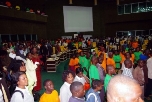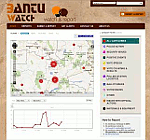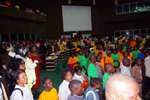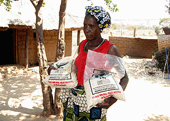Zambia
|
The country’s economy has been growing since 2000, but poverty continues to be a pressing issue while life expectancy remains very low. Although the Government has shown some concern regarding environmental challenges, the plans put in place lack coordination and have failed to create public awareness about soil erosion, loss of biomass, climate change and deforestation. The country has lost 6.3% of its forests in the last 20 years.
High poverty levels and lack of alternative sources of livelihoods exacerbate environmental degradation resulting from the dependence of poor people on natural resources. It is time for the Government to establish more adequate policies and strengthen coordination in the environment sector.
|
Published on Wed, 2011-09-28 08:10
Emily Sikazwe, executive director of Women for Change (WfC, one of the focal points of Social Watch in Zambia), congratulated Michael Chilufya Sata on his election as the 5th Republican President of that African country. She also called on “all peace loving Zambians to embrace the change of government with dignity and unity”, according to Q FM radio station. |
Published on Wed, 2011-09-21 11:04
Sources: BantuWatch, IPS, Global Voices, Reuters, AllAfrica The electoral campaign and the polls held on Tuesday in Zambia counted on unusual but effective observers: the citizens themselves could report irregularities via Twitter, SMS, Internet and telephone thanks to BantuWatch. That’s the name of an initiative headed by the Southern African Centre for the Constructive Resolution of Disputes (Saccord), with the technical support of the Dutch Humanist Institute for Development Cooperation (Hivos) and the Social Development Network (Sodnet, focal point of Social Watch in Kenya). |
Published on Mon, 2011-08-15 06:18
Sources: IPS, Women in News Women must "start working hard" to have a stronger political representation and to include gender issues for the 2016 elections, given they are not properly represented for the September 20 general elections, said Emily Sikazwe, the executive director of Women for Change, a gender focused non-governmental organization working with communities, especially women and children in rural areas and national focal point of Social Watch in this African country. |
Published on Tue, 2011-06-07 23:45
Sources Women for Change (WfC, focal point of Social Watch in Zambia) has been working for months to increase the participation of citizens, women and men, in the campaign towards the general elections to be held next September. |
|
Since the 1990s, Foreign Direct Investment (FDI) has played an increasingly important role in the country’s economy, rehabilitating the copper industry and boosting production and exports of non-traditional products and services. However, this investment has not been used effectively to promote development and reduce poverty. Instead, it is contributing to an erosion of people’s rights, including development rights, the right to food, education, a clean environment and women’s participation in political decision-making.
|
|
The global economic meltdown is already seriously affecting Zambia, which is highly dependent on the production and price of copper, its primary export. Although for the past 45 years politicians have promised to diversify into other products, almost nothing has been done. The Government’s reaction to the effects of the crisis has been both predictable and disappointing. The 2009 National Budget is in denial and Parliament is not paying attention.
|
SUSCRIBE TO OUR NEWSLETTER






